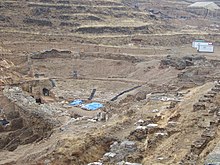Bilbilis
Bilbilis was the name of a city of the Celtiberians in the Roman province of Hispania Tarraconensis in what is now Spain. It is best known as the hometown of the Roman poet Martial .
history
The settlement was on a steep hill on the Salo River (now Jalón ). The remains can be found today on the Cerro de Bámbola near Calatayud (province of Zaragoza).
The place name is possibly derived from Birbilis , the name for a river that is identified either with the Ribota tributary or with a section of the Salo itself. It is attested by coins with the Iberian inscription plpls and with the Latin Bilbilis Italica municipium Augusta, which also indicates a separate mint. Whether Bilbilis had the status of a municipality or a colonia is controversial. In any case, it received urban structures through the settlement of Roman colonies . The highway from Augusta Emerita to Caesaraugusta passed through Bilbilis. In late antiquity, the city fell into disrepair and was eventually abandoned. Today's city of Calatayud emerged from a fortress built by the Moors about 5 km away in the 8th century.
In addition to the archaeological finds, an important source for Bilbilis is the poet Martial, who was born here in 40 AD and who returned home around the year 102, also died here. He mentions his hometown many times in his poems. After that, Bilbilis was famous for its metalworking. The sulfur springs Aquae Bilbilitanorum, about 24 km west of the Roman highway , also praised by Martial, are still used as thermal baths today ( Alhama de Aragón ). Other localities in Bilbilis and the surrounding area that Martial mentioned in large numbers can no longer be identified today.
literature
- Emil Huebner : Bilbilis . In: Paulys Realencyclopadie der classischen Antiquity Science (RE). Volume III, 1, Stuttgart 1897, Col. 470 f.
- Pedro Barceló : Bilbilis. In: The New Pauly (DNP). Volume 2, Metzler, Stuttgart 1997, ISBN 3-476-01472-X , Sp. 655.
- M. Martín-Bueno: Municipium Augusta Bilbilis. Archaeological site leaflet; PDF; 993 kB ( memento from June 26, 2012 in the Internet Archive ). In: calatayud.es. August 10, 2009, Retrieved December 6, 2017 (Spanish).
Web links
- Ayuntamiento de Calatayud: Diario de las excavaciones de Bilbilis y Valdeherrera ( Memento from June 21, 2012 in the Internet Archive ). In: calatayud.es, website of the Calatayud City Council (Spanish)
Individual evidence
- ↑ Bilbilis acutis pendentem scopulis , "hanging on a steep rock", describes it the ancient visitor Paulinus von Nola (Carm. 10,223–224).
- ↑ Just. 44.3.8; the name form with -r- also in the inscriptions CIL 6, 2728 and 12, 735.
- ↑ See Barceló (see literature ).
- ↑ According to the Itinerarium Antonini 437.3 and 439.1.
- ^ Paulinus von Nola, epist. 2.223-228.
- ↑ Mart. 1.49.4; 4,55,11; 12.18.9.
- ↑ Mart. 1.49.9.
Coordinates: 41 ° 22'56 " N , 1 ° 36'13" W.


